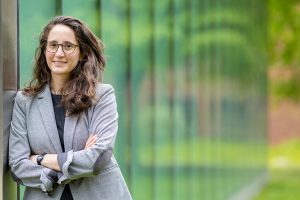Article by Wayne Gillam, photos by Ryan Hoover | UW ECE News

UW ECE Assistant Professor Sara Mouradian joined the Department in March 2022. Since then, she has established the Scalable Quantum Research Lab at the UW, which is building quantum technologies for real-world applications.
UW ECE Assistant Professor Sara Mouradian says she enjoys learning new things and looking at problems from different points of view. That’s probably a good thing, because as a researcher and educator who specializes in quantum information science and technology, or QIST, she is often presented with new and multifaceted challenges.
QIST is an emerging field that blends electrical and computer engineering with the physics of quantum mechanics, and it provides researchers like Mouradian with tantalizing opportunities to achieve far-reaching, positive impact. For example, in the future, quantum computers are widely expected to outpace today’s fastest supercomputers on certain problems in cryptography, molecular simulation, and possibly other areas as well. But there are still many difficult challenges ahead to reach this vision, including managing errors in sensitive quantum systems caused by interactions with the environment, designing architectures that enable quantum computers at a scale needed for practical tasks, and developing high-quality quantum hardware.
According to Mouradian, QIST needs people from several different disciplines working together to solve the wide array of problems involved with making quantum technologies for future applications. But this is a challenge she appears to relish.
“What I like most about quantum information processing, and my research in general, is that it brings together so many different fields,” Mouradian said. “It involves optics, electronics, nanofabrication and atomic physics. There’s a lot of different topics that one can work on within the large umbrella of QIST.”
Mouradian joined UW ECE in March 2022 as part of a UW College of Engineering cluster hiring initiative in QIST, which also included faculty hires in mechanical engineering, materials science and engineering, and computer science and engineering. Since then, she has established the Scalable Quantum Research Lab at the UW, which is building quantum technologies for real-world applications in computing, communication and sensing. Mouradian’s lab is in the NanoES building on campus, and it involves a sizable number of undergraduate and graduate students, as well as a postdoctoral associate.
“Everything around us is quantum, because everything is made up of atoms, but we usually see only the ensemble, classical properties,” Mouradian said. “In my lab, we’re building technologies that can control individual atoms and engineer interactions at the atomic level. This will help to increase our control over the quantum world.”
Mouradian is also making her mark as an educator at UW ECE, teaching a mix of undergraduate and graduate students and leading hands-on courses such as the Quantum Information Practicum, which is part of the recently established UW Graduate Certificate in Quantum Information Science and Engineering.
“Since joining our Department, Sara has hit the ground running,” UW ECE Professor and Chair Eric Klavins said. “She has already proven to be an invaluable member of UW ECE and our University community. I’m excited to see what she will accomplish in the future in regard to her research and fostering new opportunities for our students.”
Finding a collaborative environment for quantum research
Mouradian became interested in quantum technologies while pursuing her undergraduate degree at MIT and began her work in quantum computing while completing a senior research project. She received her bachelor’s, master’s, and doctoral degrees from MIT in 2010, 2012, and 2018, respectively. Before joining UW ECE, she worked as an Intelligence Community Postdoctoral Fellow at UC Berkeley.
While at UC Berkeley, Mouradian became interested in melding the classical electrical engineering she studied while pursuing her doctoral degree with the more physics-focused work she was doing in her postdoctoral fellowship. She said she liked the fact that the UW is a public university and saw UW ECE as being open to supporting research that was on the edges of traditional electrical engineering — where QIST exists. She also noted the network of support for quantum research across the UW.
“There was already such a strong recognition that quantum was really important here, through organizations such as QuantumX,” Mouradian said. “So, it felt to me like I was joining a community that was already up and running.”
Everything around us is quantum, because everything is made up of atoms, but we usually see only the ensemble, classical properties. In my lab, we’re building technologies that can control individual atoms and engineer interactions at the atomic level. This will help to increase our control over the quantum world. — UW ECE Assistant Professor Sara Mouradian
At the UW, Mouradian’s lab focuses on engineering challenges involved in using trapped calcium ions for quantum information processing. Mouradian sees using trapped ions as one of the best options available for significantly scaling up quantum systems to the level needed for practical applications. These ions are stable and capable of holding and transmitting quantum bits of information, or “qubits,” which form the basis for quantum computing.
“Every calcium ion qubit is exactly the same,” Mouradian said. “As an electrical engineer, that’s nice, because it means that the problems for trapped ions and quantum computing are mostly classical engineering problems.”
Since joining the UW, Mouradian has found no shortage of collaborators to work on those classical engineering problems with her. She has consulted with professors Mo Li and Arka Majumdar about how to use optical systems they are developing to help control trapped ions. She frequently discusses quantum theory and how it applies to her lab experiments with fellow QIST cluster hire Rahul Trivedi. And professor Scott Hauck and his students have been assisting Mouradian’s lab with designing electronic controls for quantum systems. She also has been working with Max Parsons, director of the Quantum Technologies Training and Testbed (QT3) Lab to build more opportunities for undergraduate and graduate research.
Educating the next-generation quantum workforce

Outside of the UW, Mouradian is an editor for PRX Quantum, an open-access journal that is part of the American Physical Society.
Mouradian has been enhancing academic pathways for students through avenues such as the QT3 Lab, the Quantum Information Practicum, and the ENGINE Showcase, where students from the Practicum will be presenting their work this year. She noted that determining academic and career goals is not necessarily an easy task for students. And in fact, when she herself was a student at MIT, it wasn’t always clear to her which academic direction she should pursue.
“It took me a while to acknowledge that I liked some topics more than others. If I didn’t like something, I tended to think of it as a personal failure,” Mouradian said. “I believed that if I just tried harder, I would like the subject matter more. But, in truth, I just like some topics more than others.
To help students find their way, Mouradian recommends that undergraduate students pursue a wide breadth of studies. She also said that graduate students should attend as many talks and lectures as possible and read widely to help get a better sense of what might excite and pique their interest.
Outside of the UW, Mouradian is an editor for PRX Quantum, an open-access journal that is part of the American Physical Society. The journal is expanding the number of experimental papers it features, and quantum experiments are Mouradian’s specialty. She said that she enjoys reading papers from different types of experimental research groups and helping these groups get their work published. In her free time, Mouradian also enjoys hiking, climbing, and being in the great outdoors around Seattle and throughout the Pacific Northwest.
When asked what she liked most about being an educator, Mouradian again brought up her enjoyment of learning and seeing things from different perspectives.
“Teaching is one of the best ways to learn, and it’s fun to hear the questions students have,” Mouradian said. “Their questions show me how to think about things in an entirely different way. So, I find it very rewarding to help students learn and enjoy the process of learning.”
More information about Sara Mouradian and her work as a researcher and educator is on her bio page on the UW ECE website.

